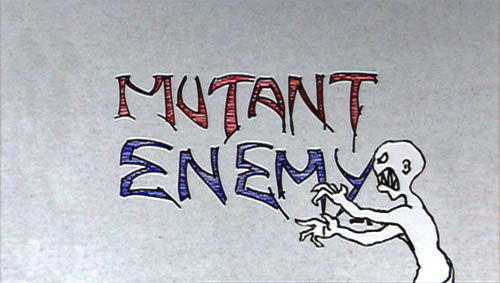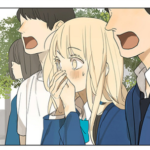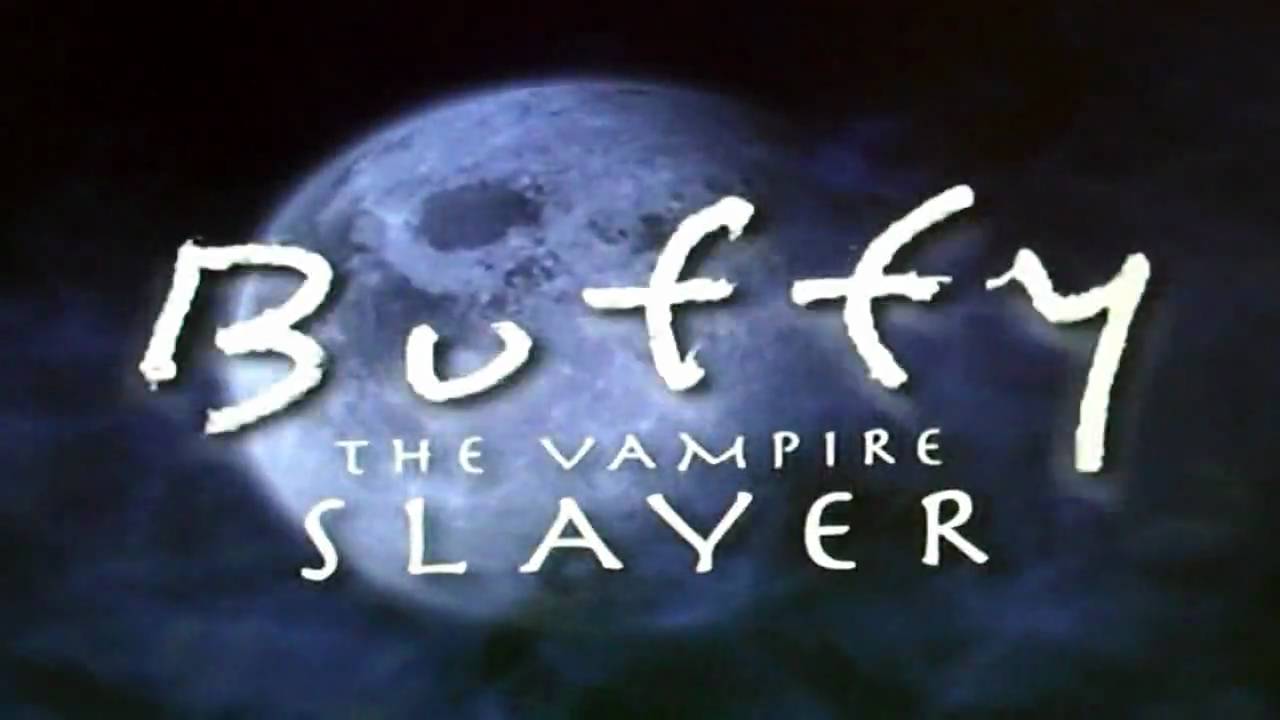
Because Buffy the Vampire Slayer is such an important show for viewers, for a network, and for television as a whole, there was no way only one person could come up with the definitive ranking seasons. Luckily there were at least two of us up to the task. Both Stephanie Pouliotte and myself (Michael Walls-Kelly) have laid out our opinions and our reasoning for why we think our personal rankings are incontrovertible.
Not really, of course, but we still have our opinions. We’ve decided to write out our feelings on each season, give a couple of recommendations for the best or most entertaining episodes, and then rank each season out of 10 “Grr Arghs”, like so:


That’s 10 “Grr Argh” Uber-Vamps out of 10 “Grr Argh” Uber-Vamps.
We’ve both taken a lot into account here when we were figuring out our final ranking. The effectiveness of storytelling, the characterization, the camerawork. But, actually, the only thing we really took into account was our emotional impressions when we watched each season. I feel like that’s what people want, two strangers’ totally subjective opinions. Which is totally fine, let’s just rank this mother and get on with it.
SEASON ONE
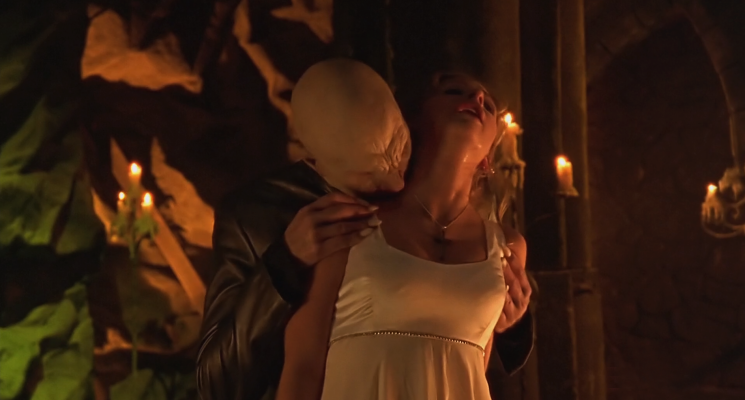
Stephanie: We all remember season one of Buffy the Vampire Slayer as a campy, monster-of-the-week show with mediocre special effects that nonetheless provided a really engaging and comedic supernatural teen drama. It was unlike any other show I’d seen, featuring a female lead from a lineage of badass warrior women who gets pulled into this dark and thrilling occult world. Buffy’s first Big Bad, the Master, was a formidable foe, though he didn’t look it, and is actually the only villain in the entire show who manages to kill Buffy by his own hands.
Looking back, most of the episodes aren’t as iconic to the show’s legacy, but by the end of the season we really come to identify with Buffy and her plucky gang of Scoobies. “Prophecy Girl” is arguably the best episode, and it’s not just because it’s the season finale. This season tried to remain fairly light, witty, and comedic throughout, but in the final episode Buffy is forced to confront the likely fate of all slayers. As a sixteen-year-old girl in the prime of her life, she completely breaks down and quits in a shaking, frightened rage, and suddenly it dawns on us what this show is really about. It’s about more than just supernatural slayage, at it’s heart it’s about the people they are and the people they become.
This is the first of many times where Buffy is called upon to make a huge sacrifice for the sake of others, and it’s something that takes a gradual toll on her throughout her life. In the midst of the campiness, the witty dialogue, the supernatural mischief, is a young woman who battles more than just demons. Buffy is constantly at odds with herself. It actually takes until the end of season thee for her to truly come into her Slayer identity, but I don’t think we ever see her be as brave as she is when she goes off to face the Master alone.
Favourite Episodes: “Prophecy Girl” and “Out of Mind, Out of Sight”


Michael: The first season of Buffy the Vampire Slayer is similar to a lot of freshman shows. It’s a testing ground for ideas, characters, and styles. The production is trying to figure out which elements work the best. In that regard it’s a big success. With a confident premiere episode and an incredible core cast there wasn’t too much they had to actually tweak. They still had a fairly small budget for a sci-fi/fantasy series that they hadn’t figured out how to work around yet. There are also a lot of “monster of the week” episodes that don’t really work, and it’s odd to have filler in a twelve episode season.
The number one thing that the series had to do at this point was give us a reason to keep watching. With the overarching story being pretty light, especially compared to later seasons, the main way to keep us coming back week after week is with the characters. The chemistry between our main four Scooby Gang members is already through the roof early on. Buffy, Giles, Willow, and Xander are all fully fleshed-out characters and even the more mysterious Angel is intriguing in a way a lot of recent shows about brooding monsters forgets to do.
As for its place in the series as a whole, season one is obviously important. Few first seasons are perfect, especially network shows and especially high concept network shows. This season did exactly what it needed to do: lay the groundwork and keep us interested. We’re introduced to Angel and Darla and their backstory, which ends up being an important part of both this series and its spin-off. We also get a season with The Master, a very fun and very scary character who shines in his limited season in a way few other Big Bads could possibly live up to it. We also get “Prophecy Girl”, one of the best episode of the whole series and something that set the tone and opened up storylines for the best run the series would have.
Favourite Episodes: “The Puppet Show” and “Prophecy Girl”


SEASON TWO
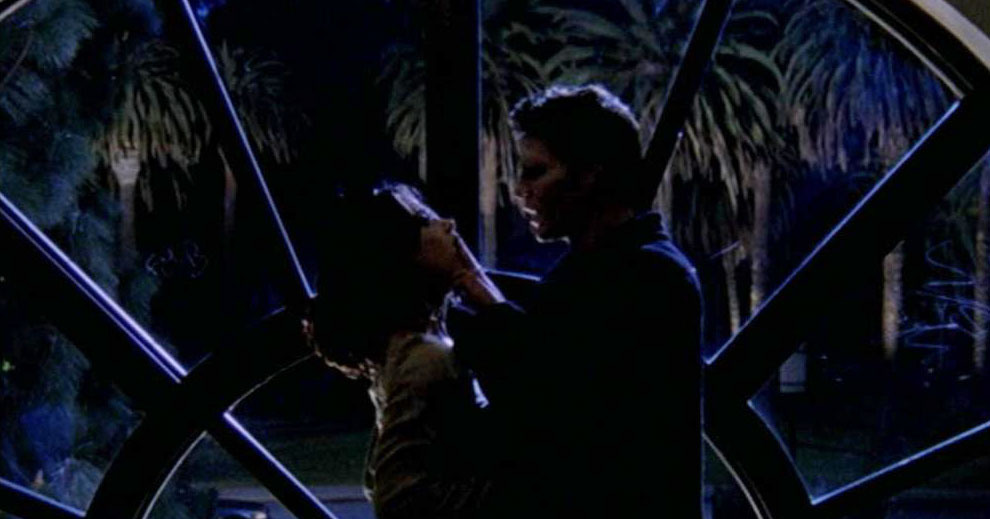
Michael: Lots of television shows are confident going into their second season. They should have worked out all the kinks from the first season and are now able to focus in on the stuff that truly works and bring in elements that complement that. Elements they decided to bring to the table this season include Spike and Drusilla. So how could this not be one of the best seasons? Even though Spike eventually overstayed his welcome (before getting another fresh start on the series Angel) you can instantly see why that would happen. He and Drusilla have such a great relationship and, as this young punk couple, are different enough from The Master to be interesting. They’re more than up to the task of standing in for our Big Bad until he shows up.
Boy did they make the right call when they decided to turn Angel — sorry, Angelus — into season two’s main antagonist. TV shows love the status quo so it’s incredibly rare for things to change too much. The fact that the writers were willing to pull the trigger and turn Buffy’s boyfriend bad is a huge mark in their favour. Everything is bigger, more dangerous, and a hell of a lot more personal. Angelus knows the best ways to hurt the Scooby Gang and I’ll be damned if he doesn’t use them. He’s easily the most personal Big Bad of the series, if not necessarily the best.
The benefit of a longer seasons means the ability to flesh out the supporting characters. Not only do we delve deeper into what makes Willow, Xander, and Giles tick (I’m especially fond of the tantalizing hints we get of Giles’s youth in “Halloween”) but we get a wider roster of supporting characters. Cordelia becomes an integral member of the Scooby Gang, in my opinion, and we meet Oz, maybe my favourite character on the show. Kendra, the Slayer that was activated when Buffy died in “Prophecy Girl” also shows up, opening up a wider world of Slayer mythology. A world that would wind up being incredibly important in the final season.
Buffy the Vampire Slayer season two is the definition of knocking a sophomore season out of the park. Everything is bigger and better and nothing has become boring or played out yet. Thankfully, that streak will continue.
Favourite Episodes: “Halloween” and “Passion”


Stephanie: The show only got better after the first season, really raising the stakes when Angel loses his soul and terrorizes Sunnydale. This was a story that needed to be told, it was the natural progression, and it certainly made Angel’s character much more interesting. Up until that point, he seemed kind of just… there? But even when he became Angelus, he still didn’t completely have me on board, although he had his moments. But how could he compete with the new vampires in town, Spike and Drusilla?
Season two had a well constructed arc that lay the groundwork for much of what was to come in the next season, but it was hindered by some of the one-shot episodes that weren’t as engaging. I enjoyed how it revealed some of the inner workings of Buffyverse, like that two slayers could be active at once with Kendra, and many secondary characters begin to develop their own niches in the group, like Willow’s budding interest in witchcraft. I don’t want to say Spike and Drusilla carried the show, but they really made a mark with their edgy and brutally twisted brand of evil. This season threw a bunch of curve balls, right up until the end when we find out that a crippled Spike’s been playing the long game.
The season ended with a devastating finale that held another emotional whirlwind for Buffy, and a serious test of her moral character. She keeps it together when it counts, tapping into her inner strength even after Angelus stripped everything away. The acting was simply electric in the final chaotic scenes, abruptly ending in a cruel respite before Buffy, once again, saves the world. It felt only right that she skipped town afterwards. Even I felt like I needed some time to process, and yes, “I needed a hug.”
Favorite Episodes: “Becoming Part 1 & 2” and “Phases”


SEASON THREE
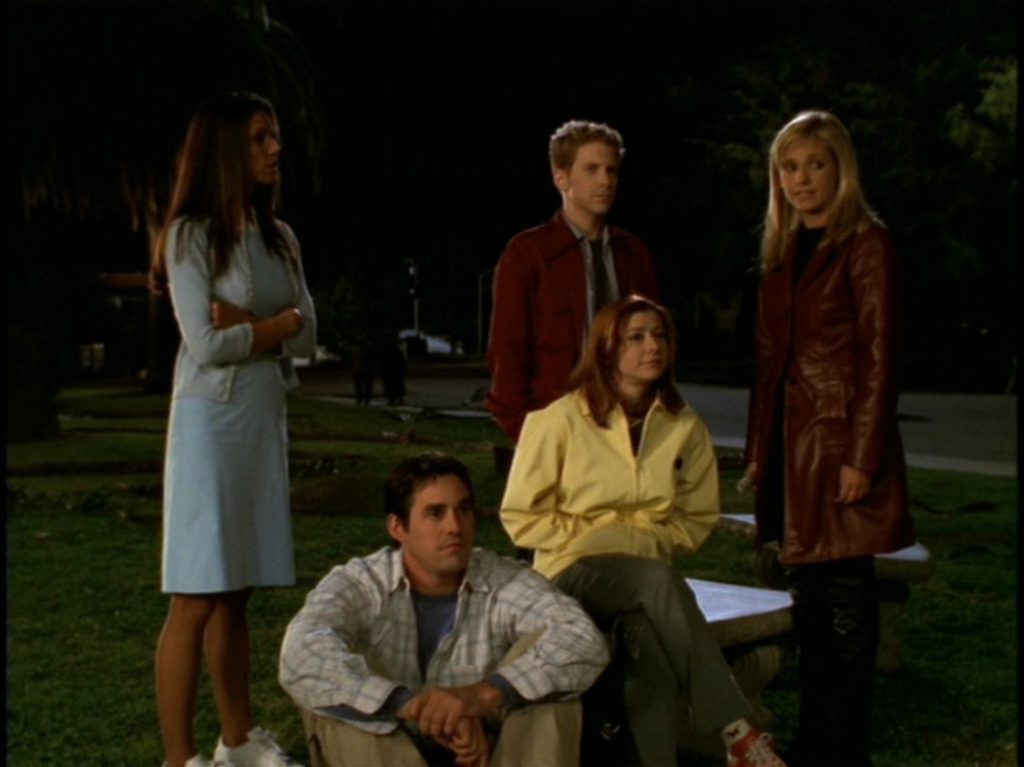
Stephanie: In season three, the show really played to its strengths. It was the culmination of the High School is Hell theme, ramping up to a satisfying end in the “Graduation Day” two-part finale. Uniting their classmates for the final fight was a bit corny, but it conjured a swelling sense of fellowship and nostalgia as the senior class desperately fights to survive this last day of high school. Buffy came into her own in this season, breaking off from the archaic watcher’s council and finding a piece of herself in Faith, who proved to be an amazing foil. The Mayor was such a gosh darn unsettling villain, and was completely different from any adversary Buffy had ever faced up until then.
I felt the season got off on a bad food with “Dead Man’s Party” though, an episode where everyone turns on Buffy because she left Sunnydale at the end of season two. You know, after her mother told her never to come home again, was expelled from school, was facing murder charges, and had to kill Angel right when he got his soul back, condemning him to a hell dimension for all eternity, but seriously how insensitive of you Buffy! Buffy deals with some pretty deep depression over the course of the series. Unfortunately her support system isn’t always the best and really makes some of these episodes cringe worthy in how it normalizes the shame directed toward what she’s going through. Cordelia of all people ends up coming to her defense, albeit badly, but between that and one of my favourite episodes ever “The Wish”, Cordy continued to hold her own throughout the season despite getting burned herself. The actress Charisma Carpenter left the show afterwards to work on Angel, where she made a lasting mark in just the first season.
Favorite Episodes: “The Wish”, “Homecoming”, and “Graduation Day Part 1 & 2”


Michael: For my money (I’m not actually giving you any money) season three of Buffy the Vampire Slayer is the best season of the entire show. It blends the different aspects of the series perfectly. We get horror, comedy, teen drama, and often all three in the same episode. With the Scooby Gang in their senior year and worrying about their futures, there’s an urgency to the season that most of the others inherently don’t have. It’s like having a series finale in the middle of your show. It helps raise the stakes. The filmmaking had gotten to the point where they knew how to shoot for their budget in a way that didn’t seem hokey, or at least didn’t seem too hokey not to ignore. The entire cast had an easy chemistry built up over the previous seasons and all of the new characters were able to keep up. (For new characters that aren’t able to keep up, see Riley).
The Big Bad of the first season was an introduction to vampires as a whole, the Big Bad of the second season was a very personal threat with Buffy dealing with her first “break up”, so it makes sense that season three’s Big Bad would be an authority figure. The Scooby Gang are basically adults now, transitioning to a new chapter in their life, breaking away from the school and, for some, even Sunnydale itself. Enter The Mayor, mentioned vaguely and menacingly in season two, he definitely lives up to our expectations. He’s equal parts goofy uncle and bone-chilling psychopath. He’s also a hell of a lot of fun. We’re also introduced to a couple other characters who are important to Buffy the Vampire Slayer and Angel, Wesley the Watcher and Faith the Slayer. Faith’s presence in season three is important because Buffy is deciding who she wants to be post-high school. Faith represents a dark mirror version of that, something she could become, or maybe even would become without the Scooby Gang.
Season three is the series firing on all cylinders. There are one or two less-than-stellar storylines or standalones, but very few seasons of any show are perfect. This one is as close as Buffy the Vampire Slayer ever got, which is damn close. We wrap up a lot of things in the finale: the Big Bad, the school, Cordelia, and Angel. It’s top quality closure for the preceding seasons and it leaves us with a question mark of what the show would become.
Unfortunately, for a short while, it would become season four.
Favourite Episodes: “The Prom” and “Band Candy”


SEASON FOUR
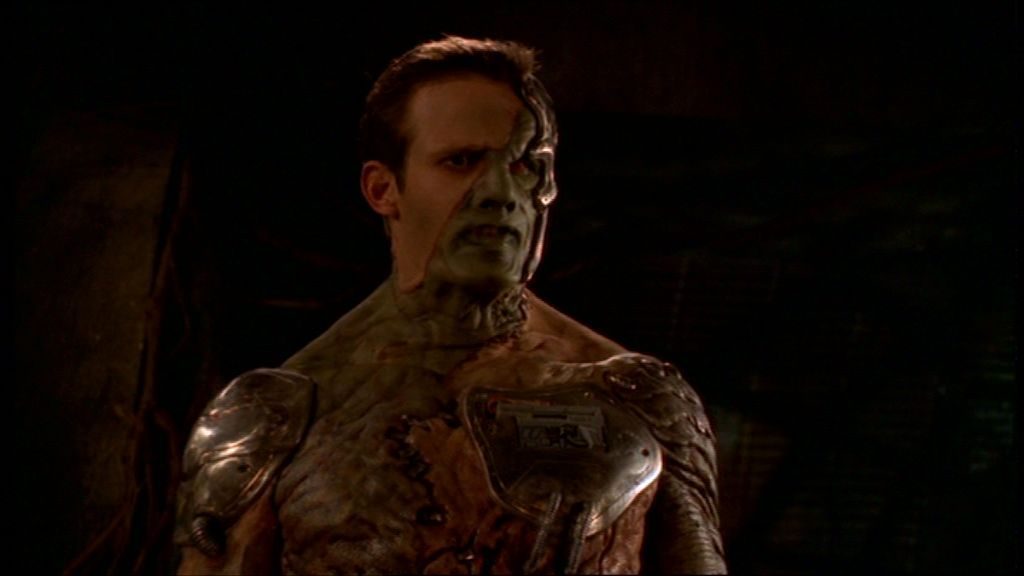
Michael: When a TV show centred around a high school has to finally bite the bullet and graduate the characters, it can be tough as hell. Graduating high school is a huge transition by its very nature but it’s hard to change a formula that works. With the title character graduating, and the school having blown up, you can’t really switch to the next graduating class. So the best a series can do is try to transition the fact that it needs to change on some level into interesting stories and character developments.
So, I guess, points for trying, season four.
What we end up getting is a smattering of half-baked ideas, storylines, and character developments that don’t fully mesh and end up leaving us unfulfilled. You can see the writers working hard to try to shape what the series will be with most of the cast in college now, and ultimately they whiff it and kick the can down the road for the next season to take a shot. The worst part is that there’s a lot of potential in the season. A monster-hunting government unit is an interesting idea that expands the universe. A Techno-Frankenstein is a fine and logical idea in the fourth season of a horror series like this. The Gang adjusting to college should open up lots of avenues for drama and tension. Nothing really comes out right though.
The Initiative failed for a couple reasons: the show didn’t really have the budget for what they were trying to do and none of the characters were that interesting. An anti-Giles is a good idea and Lindsay Crouse is a good actress but Maggie Walsh ended up being a big disappointment. The same can be said tenfold about Adam, demon/cyborg Frankenstein who uses his cunning to sow discord among the Scooby Gang. Which would also be a cool idea if Adam had anything more than the baseline of development. And the less said about Riley the better.
It’s easy to be hard on season four. Few people would call it a success and I would wager that absolutely no one considers it their favourite season of Buffy the Vampire Slayer. But on the positive side we get some fun episodes like “Hush” and “Superstar”, Anya gets more screentime and we’re introduced to Tara. The Scooby Gang continues to be charming and there’s no irreparable damage done to any of the characters. The Adam plotline is also taken care of in the penultimate episode which leaves us with a weird and entertaining epilogue in “Restless”. So if you’re running the series I wouldn’t recommend skipping over season four the first time through, but exercise those eyes because they’re going to roll a hell of a lot.
Favourite Episodes: “Superstar” and “Restless”


Stephanie: The thing about season four is that it actually had a really interesting premise with the Initiative, but just couldn’t pull it off. Coming off the show’s high point in season three, it was never going to be a perfectly seamless transition, and I actually think the first few episodes were a good lead in, if not a little light on substance. I enjoyed the dark levity of the Halloween episode “Fear, Itself” and felt that Spike’s capture by The Initiative had perfect comedic timing. After that, it kind of went off the rails. It just felt like there was no cohesion to the story, nothing to really grip us, and after season three it was a bit of a let down. The Initiative turned out to be a pretty lame military cell that regurgitated every bad shadowy government organization trope in the book. Their end goal was to create a race of human-demon hybrids bred to be super soldiers (of course) and so we get the Frankenstein-esque villain in Adam who is a poorly written facsimile and also terribly dull. And Riley wasn’t much of a deep character himself, and really stunted Buffy after her solid character growth in the previous season.
Season four did introduce Tara to the show, and she quickly fit into the gang in my eyes, but it also saw the loss of Oz. I was always a big fan of Willow and Oz, he was genuinely a really good guy up until “Wild at Heart” and at that time I didn’t get why they lazily wrote an episode where a guy cheats due to his lesser, beastly instincts. Apparently Whedon was actually intending a werewolf love triangle as a B-plot for the season, but Seth Green had already decided to leave the show. I’m not sure if this was a blessing in disguise considering how things go down, but it was pretty heartbreaking when he left the show. Oz returns in “New Moon Rising” an episode I have serious mixed feelings about. It was really nostalgic to have Oz back, I did miss him, and on the surface I liked the idea that he had to achieve some kind of inner peace with the wolf inside, but this entire episode felt like a forced way to introduce Willow and Tara as a couple. Oz just comes off really badly in how aggressive and territorial he is towards Tara, and the episode just falls back on the whole lesser instincts thing. Again.
I guess the one good thing to come from this season’s struggles was the episode “Hush”, which Whedon penned in response to critics saying the show relied too heavily on it’s witty dialogue, so he wrote an episode that basically didn’t have any. It’s not surprising that the episodes where the show actually took risks in this season are the ones that stand out, like “Hush” and the finale “Restless”, which is an addendum tacked on to the story after Adam is defeated in the unsatisfactory climactic episode “Primeval”. Whedon was also working on another project at the time and, let’s be honest, could this ever really compare to Angel’s first season?
Favorite Episodes: “Hush” and “Fear, Itself”

SEASON FIVE
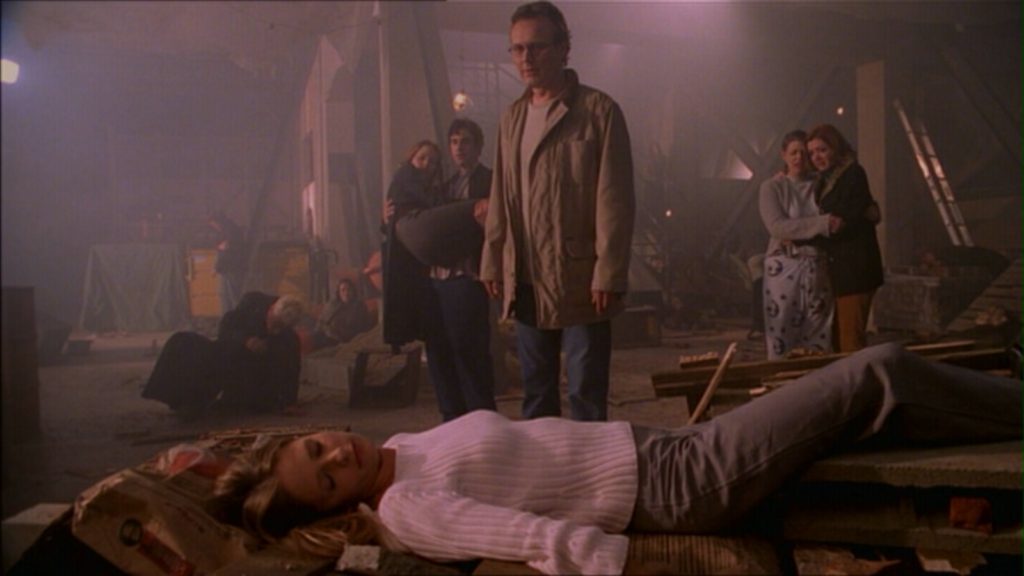
Stephanie: Ah, the most infamous season of Buffy the Vampire Slayer. Fans either love or hate this season, mainly because it introduced Dawn (and I have thoughts on this too), but let’s put a pin in that for a moment. I really enjoyed season five and it’s not just because of the amazing episodes “The Body” and “The Gift”. This season was totally engrossing and, for me, it’s the most memorable. It really picked up pace in the latter half, but even the first episodes were just extremely fun to watch. We still had an overarching villain in Glory, but it threaded the plot through some great self-contained episodes about each character. We get the compelling backstory of Spike’s life in “Fool for Love”, and a poignant episode about personal acceptance and friendship when Tara’s family comes to abduct her in “Family”. “The Replacement” was a Xander episode filled with a little self-deprecation punctured by adorable comedic moments. I really liked Anya and Xander together and he seemed to be filling out more as a character, even if I strongly feel he had a totally backwards view on Buffy and Riley’s relationship in “Into the Woods”.
I’m happy Riley left, everything about his relationship with Buffy was toxic, not just for them, but for the show. He was a drag on the story, his character arc flat lined and went nowhere, and the way he handled his inability to accept that Buffy doesn’t need him the way he wants her to need him, was totally bizarre. It seemed like Buffy is never able to just deal with her own shit without being branded as the girl who pushed her boyfriend to getting drained by female vamps, and by one of her closest friend no less. She’s in a perpetual guilt trip inflicted on her by her closest friends and family and it’s just so… unnecessary. I mean I get it Riley, Buffy isn’t opening up, but can you maybe take a step back and realize it isn’t about you? Between finding out that her sister is pure energy, that a god from a hell dimension is threatening her family, and that her mother developed a deadly brain tumor, can’t you just accept that she has a lot of things she has to deal with in her own way, even if that means she needs space? I find it so hard to sympathize with this guy.
In any case, the lead up to Glory is really the meat of this season and it escalates beautifully. Though they’ve face Armageddon before, the idea of fighting a god seems almost insurmountable and the Scoobies are on their toes the whole season. Using Ben to anchor Glory and somewhat limit her powers was really clever and all the near misses continued to put pressure on the gang. Spike also develops his feelings for Buffy in this season, and though the whole Buffy bot seems likes something I would totally hate, I found it actually folded well into the story and Spike doesn’t get to walk away from the consequences of his actions unscathed. Sarah Michelle Gellar also plays a convincing Buffy bot.
The foreshadowing in this season is really phenomenal as well, I think mostly because “The Gift” was originally billed at the series finale, so many of the ideas Whedon had for the series were packed in before the end. From Willow going all Dark Witch on Glory after she consumes part of Tara’s mind, to the series taking on a much more morbid tone as Giles takes the life on an innocent to protect the world from Glory’s likely inevitable return. Oh, and Buffy sacrifices herself to save the world again. It feels different this time though, more gut-wrenchingly poetic, more beautifully harrowing that I can’t help but well up every time I watch it.
Favorite Episodes: “The Gift”, “The Body”, and “Family”



Michael: Season five has a surprisingly confident premiere, especially coming after a poorly-received season. Instead of reinforcing the status quo or reassuring us that the Buffy we know and love is back on track, they start off with a goofy episode that pits Buffy against Dracula. Then they end that episode with a cliffhanger about Buffy’s new surprise sister. That’s a ballsy approach and it shows that the writers had a clear picture of what they were doing and where they were going.Tthey weren’t going to bother with reassurances. Season five is absolutely a controversial season, in many ways a “final” season like three was, but it’s ultimately a success.
The major dividing storyline of the season is Dawn. Buffy’s new sister who is only new to us as the audience. Can you imagine what Twitter would have been like if it existed when she showed up? She’s definitely grating in a way most younger siblings from a teen show can be, but the mystery is worth it. She’s more of a plot device than an actual character for most of the season, connecting Buffy with Glory, but she ends up coming into her own enough for the finale to land as powerfully as it does. Speaking of Glory — AKA Glorificus, much worse than the Angel/Angelus thing — she’s a solid addition to the Big Bad canon. Our first female Big Bad automatically has a connection to Buffy by bringing an aspect to their rivalry that previous villains couldn’t.
Structurally it’s a very solid season, much more confident than season four. The major drag on the pacing is Riley, a loose string from the previous season that they just couldn’t work back into the show well enough so they decided to cut out entirely. It was the smart choice but his screen time can’t help but feel like a waste. On the plus side we get a lot more Tara and Anya, both of them moving beyond plot devices used to develop Willow and Xander and becoming fleshed out characters in their own right. Season five may also have the best sustained use of Spike while he’s “good”.
This season was the last one for WB before they premiered on UPN (both networks would then combine to form The CW, a present day teen drama Voltron) for season six. As such, it’s treated as a big event. Buffy the Vampire Slayer ended up basically having three “series” finales with their graduation from high school, their network hopping, and their true finale. So it feels right that Buffy would die. It’s the ultimate sacrifice she could make and, honestly, something we’d expect her to do eventually. Luckily it was in a faux-finale. While there wasn’t necessarily any extreme tension from fans who knew the show was coming back on UPN, I mean, the show is called Buffy the Vampire Slayer after all, there was enough of an emotional cliffhanger, and the need to see if the writers would screw up Buffy’s resurrection, to keep viewers hanging on.
Favourite Episodes: “The Gift” and “The Body”


SEASON SIX
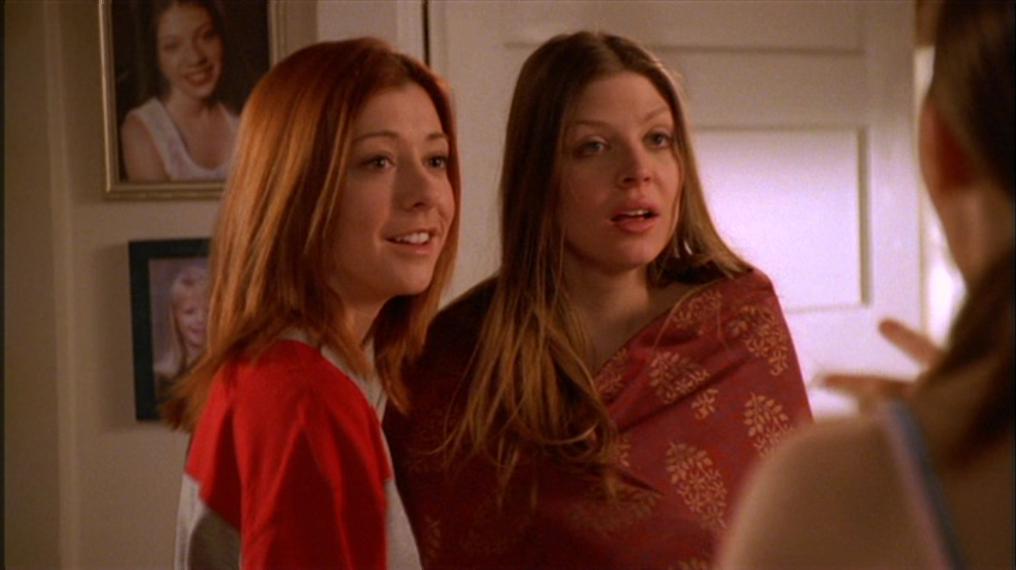
Michael: The biggest victim of the Scooby Gang graduating from high school has to be Giles. It’s just unnatural to be hanging out with your school librarian once you’re on your way through high school, regardless of how cool he is. The show tried hard to keep Giles around and The Magic Box was a great way of creating a centre for the characters and keeping Giles relevant. At the same time, I totally understand why Anthony Stewart Head wanted to move on and why the show couldn’t really justify a way to keep him. Ultimately he’s only absent from a small section of the series as a whole, but losing a chunk of the original four Scoobies is still a big mark against season six.
There’s a very odd structure to this season and part of that is the fact that it’s rebuilding from killing off its title character. Once Buffy’s resurrected the stakes decrease considerably. To combat this they chose The Trio as the fake-out Big Bads of the season. They’re like Spike and Drusilla but, you know, not like them at all. Oddly, The Trio has aged well as villains in the sense that entitled nerds are the worst these days. Buffy tried to warn us, man. But on the other hand, they’re a tough sell. They become pitch black comedy with Andrew and Jonathan being bitter but fairly innocent and Warren being a full-blown MRA psychopath. It’s just tough stuff to get through, especially once Warren kills a kind and important character, one half of one of TV’s earliest lesbian couples. Points to the show for going there, and I totally understand why someone would love this season, but it never completely clicked for me. It was some tough stuff.
Speaking of too much, can we talk about Spike and Xander? Season six did a major disservice to both characters. It’s where I think the full network schedule falls short. If they were both supporting characters in a 12 or 13 episode season instead of carrying their own half-baked storylines it wouldn’t be an issue. As it is Xander becomes a whiny jackass and they turn rehabilitated Spike into a full-on rapist. Like I said, it’s tough stuff. Xander at least gets to bring down Dark Willow when she’s on the loose due to her grief over Tara’s death. The finale isn’t entirely satisfying but it’s generally worth it for the heart-to-heart between Willow and Xander. It brings the stakes crashing down to Earth after season five. It makes it personal and gives the turn of events a solid pay-off.
As for Spike… he’s a lot harder to square away. The character tried to rape our hero. That’s messed up. The season cliffhanger shows him trekking to a demon in Africa and, seemingly by accident, getting his soul back. It’s certainly an intriguing cliffhanger and it gave me hope for where his story was headed, but they dug themselves a hell of a hole to climb out of. As much as we know in the mythology of the show, that Spike has no soul, it’s still a lot to handle when he seriously assaults our lead character. It was a misstep that the character never fully recovered from until he was divorced of the series entirely and showed up in Angel.
Overall the season had some high highs (“Once More, With Feeling”, Warren being flayed, the effectiveness of Tara’s death) and some very low lows (the aforementioned Xander and Spike) but overall it just missed the mark a little too much for me. It’s definitely not bad but I wouldn’t go too far out of my way to defend it.
Favourite Episodes: “Once More, With Feeling” and “Seeing Red”


Stephanie: Season six kind of meanders around for the most part and I think it gets a lot of flack because of it. It clumsily tries find it’s footing after the title character got the axe in a pretty intense season five finale. Buffy’s death ended last season on a note of absolute dread, yet her epitaph bore truly fitting final words. How could the show go on without her? Fans are really split on this one, season six seemed to have lost the essence of what made Buffy, well Buffy, but I think it makes total sense that the fallout of her death and resurrection is a kind of ambivalent disarray, which turns into this dark, yet mundane new existence that seems to really grind her down.
Season six is where Buffy got “too real” for some, but I actually was pretty into it. Struggling through a mounting depression after being ripped from Heaven and thrust back into a life where her mother is dead and she has no education, experience, or marketable skills, the slayer is flipping burgers at the Doublemeat Palace, applying for bank loans, and trying to charm the pants off social workers, not the most riveting plot I’ll admit. The obstacles that stand in her way aren’t always supernatural, and most of the season is spent foiling the annoying and increasingly disturbing antics of the nerd Trio.
In getting more literal, the series lost a bit of it’s magic, ironically in a season where magic ends up, in a way, being the Big Bad. I felt lost, and I think Buffy and the entire gang did too, but that was the whole point. It was a season that went through the seven stages of grief, from Willow’s total denial in the face of Buffy’s death and to her acceptance that Tara is gone (and the part she played in that) in the finale. The entire season is about coming to terms with the pain and suffering in life that can’t be avoided, and how that isn’t supernatural, but very natural (something that is touched on in the season five episode “The Body”). What I love so much about Buffy is that the show generally doesn’t shy away from the consequences of its plot (though some characters seem to get away with a lot).
Resurrecting a main character isn’t a new plot device, and we basically saw it coming since a show carrying her name couldn’t very well go on without Buffy, so I’m happy they got that out of the way in the two-part season opener “Bargaining” (which is one of my favourite season openers). The fallout of this decision was handled perfectly; the show didn’t take what Willow did lightly or simply use her magic as some fortuitous story event that’s quickly forgotten. Nothing goes back to the way it was, like Willow (and fans) hoped it would. It had real lasting consequences on every single character. Giles’ reaction when he finds out what Willow did echoed my feelings perfectly, and they continued to dig at it the entire season, questioning everything we took for granted. Then we had the amazing back-to-back episodes in “Once More, with Feeling” and “Tabula Rasa” that organically pushed everyone beyond their breaking points and released some crazy tension leading to Willow’s descent into magic abuse.
There were certainly some filler episodes that kind of broke up the flow and the writing was disjointed with Whedon’s hiatus to work on the Firefly pilot. It was a dangerous time for him to step away, but he did work on the season’s highlight episodes. We also see the worst of many characters, the biggest let down being the regression of Xander’s character in “Hell’s Bells”. It was certainly for me the most frustrating episode, and really cemented his weak character arc. From the start of the series, Xander had this weird complex where he expected, if not demanded, affection from nearly every female friend and couldn’t help himself from judging their choices (and vocalizing it… often). He had a serious issue with strong women, and in a way (especially at the time) I got why it was emasculating to him in the early years. I mean a badass little blond cheerleader with super strength? It’s clear Whedon was making a point in creating a stark contrast, he was blatantly trying to subvert that trope because we get it, girls on average aren’t stronger than men and society expects men to be manly. The adjustment period in the high school years is understandable (even if his Nice Guy shtick seriously irked me), but by season six I’d had enough of Xander’s attitude. Dude, get over it. He had so many chances to rise to the occasion throughout the show, and “Hell’s Bells” was just the final fucked-up hurrah. Even his heartfelt speech in the season finale didn’t redeem him in my eyes.
Aside from season four, I think “The Grave” was the worst finale of the entire series (and was consequently the only one Whedon didn’t write). Don’t get me wrong, I was so on-board with Dark Willow and she certainly ranks high on my list of favourite Big Bads, but they didn’t give her enough room to stretch her tendrils in just the last three episodes. She had a great set up though, if not a bit protracted because of everything else going on, and after “Dead Things” I was so ready for some flaying. The finale just lost momentum and though I felt a satisfying, somewhat cathartic release when Willow finally let go, the final scene fell flat. Plus I missed Giles, a lot.
Favorite Episodes: “Once More, with Feeling” and “Tabula Rasa”



SEASON SEVEN
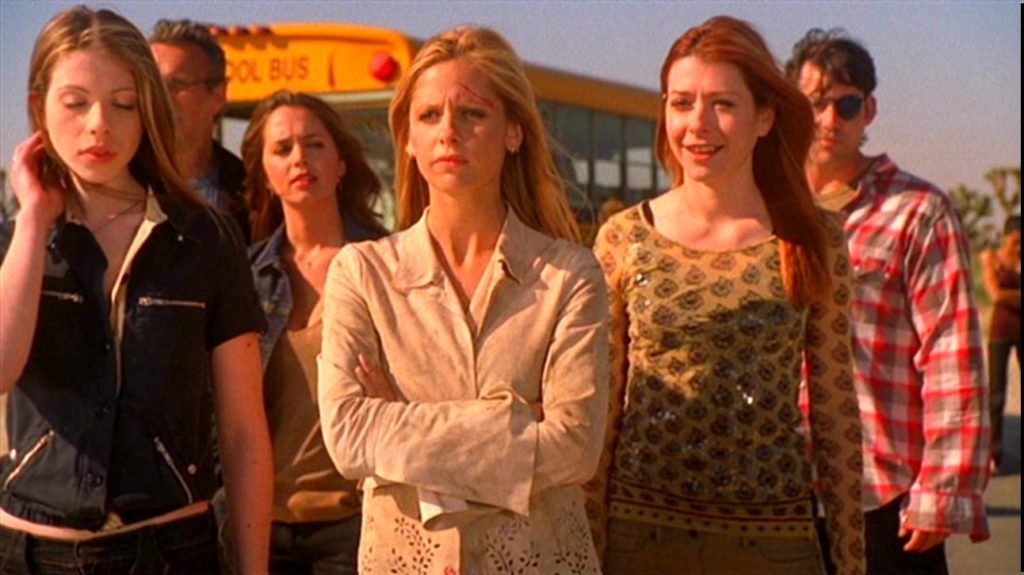
Stephanie: Despite the ambitiously all-encompassing villain in The First Evil, the final season of Buffy felt like the show was simply worn out. The story had great potential with the potential slayers; it was such a fitting end to a show where the primary goal was to celebrate female strength and empowerment. I love how Buffy was now actively shaping the mythology. There were no more rules, or at least none that Buffy and the gang couldn’t break, but the season suffered from too many moving parts. It felt like we were ghosting through the story to get to the finale “Chosen”, I have a hard time thinking of any truly remarkable episodes. I was happy to see Faith return, and Anya had some of the greatest character development in this season. She gets killed off in the finale however, almost as an afterthought. I can understand writing a death that is more muted, with less fanfare, but Anya’s death just felt like filling a series-finale kill quota and that made it somewhat disingenuous.
Favorite Episodes: “Chosen” and “Selfless”


Michael: The final season of Buffy the Vampire Slayer had a lot of things to handle. It had to wrap up the mythology in a satisfying way, it had to pay off seven seasons worth of character development and it had to deliver a compelling season on its own terms. Overall I’d consider it a success even though the seams started showing from the storytelling pressure it was under. We get the return of Faith, the regular return of Giles, some great character development for Anya and Dawn, and it puts in the work to make us give a shit about Spike again. We’re also treated to Nathan Fillion as a thoroughly creepy henchman named Caleb, ripped straight from The Night of the Hunter, and a Big Bad which is both threatening and nicely fitting for a final season.
Weirdly, I remember The First Evil being discussed as a possible Big Bad for Buffy’s final season. I must have been at the age where I paid attention to idle speculation online (and it’s all been downhill since then) and it made perfect sense, so I’m not at all surprised that that’s what they went with. Season seven is very much a “who are we and what’s next?” type of season. The Scooby Gang is coming to terms with who they’ve been and now, as adults, they’re worried about the next generation to take up their monster fighting mantle. Season seven digs deep into the Slayer mythology, pulling out the Potentials, the First Evil, etc. and giving them a payoff.
Not all of it ended up being satisfying. Jonathan is an entertaining character and I enjoyed his rehab with the Scooby Gang but I don’t know if I’d call it necessary. The Potentials ended up being more confusing than was probably intentional, but it was fitting that the finale literally showed a whole bunch of girls worldwide being more powerful than they realized. New characters like the Potentials and Robin Wood don’t get a lot of time to develop, but generally serve their purpose.
The true power of the final season is how we leave our main characters. The writers know well enough to give us a final moment between the original four Scoobies, but every supporting player gets a general wrap-up in the last season. Spike gets an “oh, I’m so sad, I have a soul now, boo-hoo” arc which doesn’t seem as drawn out on a rewatch as it did when it originally aired. But he also gets an extremely fitting “death” scene with a perfect capper to his and Buffy’s relationship. Anya’s death is more controversial and, while I understand the reasoning behind having someone fall in battle unceremoniously, I’m still pretty mad about it.
By the seventh season Buffy the Vampire Slayer was a show straining under its own mythology and the needs of its stars. Seven years is a long time and it’s no wonder that everyone wants to wrap it up. Under the circumstances they did a fantastic job, delivering some great standalone episodes and a satisfying finale. Really, what more can we ask for from a series?
Favourite Episodes: “Conversations with Dead People” and “Storyteller”



Stephanie’s Final Ranking: 3, 5, 2, 6, 1, 7, 4
Michael’s Final Ranking: 3, 2, 5, 7, 1, 6, 4
